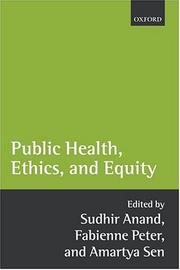| Listing 1 - 10 of 10 |
Sort by
|
Book
ISBN: 9781847206763 Year: 2009 Publisher: Cheltenham Elgar
Abstract | Keywords | Export | Availability | Bookmark
 Loading...
Loading...Choose an application
- Reference Manager
- EndNote
- RefWorks (Direct export to RefWorks)
Multi
ISBN: 9780748641376 9780748638697 0748638695 0748641378 0748652817 1282703129 9786612703126 Year: 2009 Publisher: Edinburgh: Edinburgh University Press in association with The Aga Khan University,
Abstract | Keywords | Export | Availability | Bookmark
 Loading...
Loading...Choose an application
- Reference Manager
- EndNote
- RefWorks (Direct export to RefWorks)
Luck egalitarianism is a family of egalitarian theories of distributive justice that aim to counteract the distributive effects of luck. This article explains luck egalitarianism's main ideas, and the debates that have accompanied its rise to prominence. There are two main parts to the discussion. The first part sets out three key moves in the influential early statements of Dworkin, Arneson, and Cohen: the brute luck/option luck distinction, the specification of brute luck in everyday or theoretical terms and the specification of advantage as resources, welfare, or some combination of these. The second part covers three later developments: the democratic egalitarian critique of luck egalitarianism, the luck egalitarian acceptance of pluralism, and luck egalitarian doubts about the significance of the brute luck/option luck distinction.
Philosophy --- Equality. --- Distributive justice. --- Political science --- Philosophy. --- Equality --- Distributive justice --- Social contract
Book
Year: 2009 Publisher: Pretoria University Law Press (PULP)
Abstract | Keywords | Export | Availability | Bookmark
 Loading...
Loading...Choose an application
- Reference Manager
- EndNote
- RefWorks (Direct export to RefWorks)
Social rights --- Remedies (Law) --- Distributive justice --- Human rights
Book
Year: 2009 Publisher: Pretoria University Law Press (PULP)
Abstract | Keywords | Export | Availability | Bookmark
 Loading...
Loading...Choose an application
- Reference Manager
- EndNote
- RefWorks (Direct export to RefWorks)
Social rights --- Remedies (Law) --- Distributive justice --- Human rights
Book
Year: 2009 Publisher: Pretoria University Law Press (PULP)
Abstract | Keywords | Export | Availability | Bookmark
 Loading...
Loading...Choose an application
- Reference Manager
- EndNote
- RefWorks (Direct export to RefWorks)
Social rights --- Remedies (Law) --- Distributive justice --- Human rights
Book
ISBN: 9780748638697 0748638695 9780748641376 0748641378 0748652817 9780748652815 1282703129 9781282703124 9786612703126 6612703121 Year: 2009 Publisher: Edinburgh Edinburgh University Press
Abstract | Keywords | Export | Availability | Bookmark
 Loading...
Loading...Choose an application
- Reference Manager
- EndNote
- RefWorks (Direct export to RefWorks)
An overview of and critical engagement with the key issues concerning luck egalitarianism.
Equality. --- Distributive justice. --- Political science --- Philosophy. --- Equality --- Distributive justice --- Social contract --- Philosophy --- Political philosophy --- Distribution (Economic theory) --- Justice --- Social justice --- Wealth --- Egalitarianism --- Inequality --- Social equality --- Social inequality --- Sociology --- Democracy --- Liberty --- Moral and ethical aspects --- Social contract. --- Social compact --- Consensus (Social sciences) --- Sovereignty --- Political science - Philosophy
Book
ISBN: 9780745328621 9780745328614 074532861X 0745328628 1849644209 9781849644204 Year: 2009 Publisher: London Pluto Press
Abstract | Keywords | Export | Availability | Bookmark
 Loading...
Loading...Choose an application
- Reference Manager
- EndNote
- RefWorks (Direct export to RefWorks)
Argues that global wealth inequalities need to be addressed to achieve lasting social and economic development in all countries.
Distributive justice. --- Finance, Public. --- Taxation. --- Welfare economics. --- Impôt --- Finances publiques --- Economie du bien-être --- Justice distributive --- Distribution (Economic theory) --- Justice --- Social justice --- Wealth --- Economic policy --- Economics --- Social policy --- Cameralistics --- Public finance --- Currency question --- Duties --- Fee system (Taxation) --- Tax policy --- Tax reform --- Taxation, Incidence of --- Taxes --- Finance, Public --- Revenue --- Moral and ethical aspects --- Public finances --- armoede --- belastingen --- internationale solidariteit

ISBN: 0199281688 9780199281688 Year: 2009 Publisher: New York (N.Y.): Oxford university press,
Abstract | Keywords | Export | Availability | Bookmark
 Loading...
Loading...Choose an application
- Reference Manager
- EndNote
- RefWorks (Direct export to RefWorks)
The Egalitarian Conscience pays tribute to the highly influential work of Professor G. A. Cohen. Professor Cohen is a philosopher of international stature and tremendous achievement, who has been vital to the flourishing of egalitarian political philosophy. He has a significant body of work spanning issues of Marxism and distributive justice, consistently characterized by original ideas and ingenious arguments. The high standard of rigour he sets for progressive thinkers, particularly himself, has been a source of inspiration for colleagues and students alike. The volume honours Professor Cohen with first-rate essays on a number of significant and fascinating topics, reflecting the wide-ranging themes of Professor Cohen's work, but united in their concern for questions of social justice, pluralism, equality, and moral duty. The contributors are scholars of international stature: Joshua Cohen, Jon Elster, Susan Hurley, Will Kymlicka, Derek Parfit, John Roemer, T. M. Scanlon, Samuel Scheffler, Hillel Steiner, and Jeremy Waldron. There is an afterword by G. A. Cohen.
Equality --- Social justice --- Communism --- Cohen, G. A. --- Communism. --- Equality. --- Social justice. --- Justice --- Egalitarianism --- Inequality --- Social equality --- Social inequality --- Political science --- Sociology --- Democracy --- Liberty --- Bolshevism --- Communist movements --- Leninism --- Maoism --- Marxism --- Trotskyism --- Collectivism --- Totalitarianism --- Post-communism --- Socialism --- Village communities --- Cohen, Gerald Allan, --- Cohen, Jerry, --- Pluralism --- Distributive justice --- Cohen, G. A. (Gerald Allan), --- Cohen, G. A. (Gerald Allan), - 1941-2009
Book
ISBN: 9780691140537 0691140537 9781400831715 1400831717 1282935925 9786612935923 1282473166 9786612473166 Year: 2009 Publisher: Princeton: Princeton university press,
Abstract | Keywords | Export | Availability | Bookmark
 Loading...
Loading...Choose an application
- Reference Manager
- EndNote
- RefWorks (Direct export to RefWorks)
"Luck egalitarianism"--the idea that justice requires correcting disadvantages resulting from brute luck--has gained ground in recent years and is now the main rival to John Rawls's theory of distributive justice. Health, Luck, and Justice is the first attempt to systematically apply luck egalitarianism to the just distribution of health and health care. Challenging Rawlsian approaches to health policy, Shlomi Segall develops an account of just health that is sensitive to considerations of luck and personal responsibility, arguing that people's health and the health care they receive are just only when society works to neutralize the effects of bad luck. Combining philosophical analysis with a discussion of real-life public health issues, Health, Luck, and Justice addresses key questions: What is owed to patients who are in some way responsible for their own medical conditions? Could inequalities in health and life expectancy be just even when they are solely determined by the "natural lottery" of genes and other such factors? And is it just to allow political borders to affect the quality of health care and the distribution of health? Is it right, on the one hand, to break up national health care systems in multicultural societies? And, on the other hand, should our obligation to curb disparities in health extend beyond the nation-state? By focusing on the ways health is affected by the moral arbitrariness of luck, Health, Luck, and Justice provides an important new perspective on the ethics of national and international health policy.
Social medicine. --- Health services accessibility. --- Equality --- Medical policy --- Social justice. --- Health aspects. --- Social aspects. --- toegang tot de gezondheidszorg --- gelijkheid (gelijkheidsbeginsel) --- accès aux soins de santé --- égalité (principe d'égalité) --- Health services accessibility --- Social justice --- Social medicine --- ethiek (ethische aspecten) --- filosofie (filosofische aspecten) --- gezondheidszorgbeleid (gezondheidszorghervorming, gezondheidszorgsysteem) --- rechtvaardigheid (rechtvaardigheidsprincipe, distributieve rechtvaardigheid) --- Medical care --- Medical sociology --- Medicine --- Medicine, Social --- Public health --- Public welfare --- Sociology --- Medical ethics --- Medical sociologists --- Justice --- Health care policy --- Health policy --- Medicine and state --- Policy, Medical --- Public health policy --- State and medicine --- Science and state --- Social policy --- Access to health care --- Accessibility of health services --- Availability of health services --- Health aspects --- Social aspects --- ethique (aspects ethiques) --- philosophie (aspects philosophiques) --- politique des soins de santé (réforme des soins de santé, système des soins de santé) --- justice (principe de justice, justice distributive, justice sociale) --- Government policy --- Access --- Equality - Health aspects. --- Medical policy - Social aspects.

ISBN: 0191534803 1281198447 9786611198442 1435618289 9780191534805 9781435618282 0199276366 9780199276363 0199276374 9780199276370 1383041989 Year: 2009 Publisher: Oxford: Oxford university press,
Abstract | Keywords | Export | Availability | Bookmark
 Loading...
Loading...Choose an application
- Reference Manager
- EndNote
- RefWorks (Direct export to RefWorks)
This book builds an interdisciplinary understanding of health equity with contributions from philosophers, anthropologists, economists and public-health specialists. It centres on five themes: what is health equity, health equity and social justice, responsibilities for health, ethical issues in health evaluation, and anthropological perspectives.
Equality --- Public health --- Medical care --- Medical ethics --- Right to health --- World health --- België --- ethiek (ethische aspecten) --- gezondheidseconomie (gezondheidszorgeconomie) --- gezondheidszorgbeleid (gezondheidszorghervorming, gezondheidszorgsysteem) --- rechtvaardigheid (rechtvaardigheidsprincipe, distributieve rechtvaardigheid) --- volksgezondheid --- 316 --- 351.84 --- 614 --- 351.84 Sociaal zekerheidsrecht. Sociaal bestuursrecht. R.S.Z.--(sociale verzekering zie {369}) --- Sociaal zekerheidsrecht. Sociaal bestuursrecht. R.S.Z.--(sociale verzekering zie {369}) --- 316 Sociologie --(algemeen) --- Sociologie --(algemeen) --- Health care, Right to --- Health, Right to --- Medical care, Right to --- Right to health care --- Right to medical care --- Social rights --- Belgique --- ethique (aspects ethiques) --- économie de la santé (économie des soins de santé) --- politique des soins de santé (réforme des soins de santé, système des soins de santé) --- justice (principe de justice, justice distributive, justice sociale) --- santé publique --- Openbare gezondheidszorg--(zie ook {351.84}) --- Social ethics --- Global Health Equity Initiative. --- Health Status. --- Public Health --- Social Justice --- Socioeconomic Factors. --- Ethics. --- Public Health. --- Health Policy. --- Health Services Accessibility. --- Ethics, Medical. --- Social Justice. --- Public health. --- Health services accessibility. --- Medical ethics. --- Medical policy. --- Social justice. --- Santé publique --- Services de santé --- Ethique médicale --- Politique sanitaire --- Justice sociale --- Accessibilité --- WA 30 Social, economic, and environmental factors in public health (General) --- Socioeconomic Factors --- Health Status --- Resource Allocation --- Ethics --- Health Care --- Global Health Equity Initiative --- Santé publique. --- Soins médicaux. --- Éthique médicale. --- Droit à la santé.
| Listing 1 - 10 of 10 |
Sort by
|

 Search
Search Feedback
Feedback About UniCat
About UniCat  Help
Help News
News